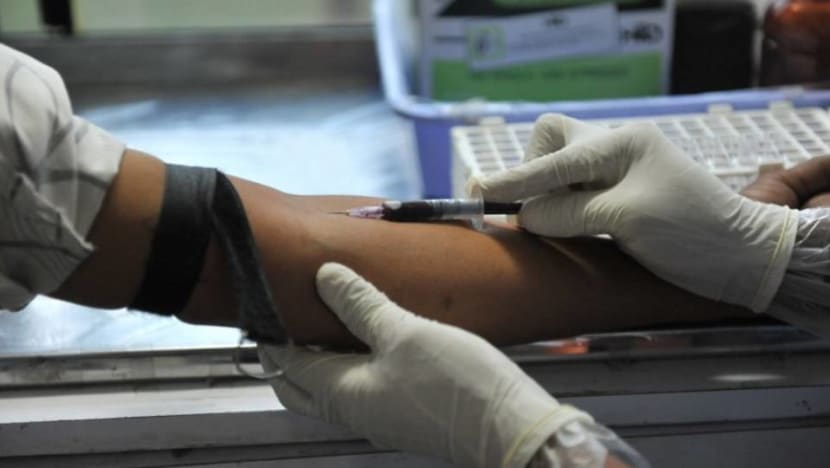'It's a death sentence': HIV myths debunked

A healthcare worker draws a blood sample from a man getting tested for HIV/AIDS. (Photo: AFP/ Noah Seelam).
SINGAPORE: "It's a death sentence" is a common yet misguided outcry when most people broach the topic of HIV, or human immunodeficiency virus.
On Monday (Jan 28), it was reported that the HIV-positive status of 14,200 people in Singapore had been leaked online by US citizen Mikhy Farrera Brochez, leading many to speculate about the virus and how it is transmitted.
READ: Mikhy Brochez, American wanted in Singapore for HIV data leak, charged in US for trespassing
Here are some common misconceptions about HIV, debunked:
MYTH 1: HIV IS TRANSMITTED ONLY THROUGH SEX
HIV can spread through unprotected sexual intercourse with a partner who is HIV-positive. However, it can also spread via non-sexual contact and means, as certain body fluids like blood and breast milk can transmit the virus as well.
This means that the virus can be passed along by sharing needles, receiving tainted blood transfusions or from a HIV-positive mother to her child during pregnancy, childbirth or breastfeeding.
HIV cannot be spread through social contact like touching, kissing and hugging, as the virus does not survive long outside the human body.
MYTH 2: HIV CAN SPREAD EASILY
While there is no cure for HIV, the spread of the virus can be contained.
Those with a HIV-positive status can seek anti-retroviral drugs that suppress the virus. Taking a combination of these drugs can reduce the amount of virus in an infected person's blood and bodily fluids.
This greatly reduces the chances of an infected person transmitting HIV to a sexual partner.
Even before an HIV infection, these anti-retroviral drugs can be used to prevent an infection if someone suspects that they may have been exposed to the virus. However, it must be started within 72 hours of a suspected exposure to HIV.
Those at a higher risk of HIV can also take preventive measures like pre-exposure prophylaxis (PrEP), which comprises two anti-viral medications - tenofovir and emtricitabine - that, when taken, reduces the chances of contracting HIV infection.
Finally, using condoms can also reduce the risk of getting HIV.
MYTH 3: HIV = AIDS
The Acquired Immune Deficiency Syndrome (AIDS) is caused by HIV, but it refers to the final stage of an HIV infection. AIDS occurs if the virus has managed to compromise the immune system.
As HIV destroys white blood cells that are vital for the body to fight off infections, it could progress to become AIDS.
However, the HIV virus can take up to 10 years to develop into AIDS. Even then, not everyone with HIV will see their condition develop into AIDS.
MYTH 4: HIV IS TRANSMITTED THROUGH SEX BETWEEN MEN
According to the Ministry of Health's HealthHub portal, 90 per cent of HIV infections in Singapore occur through sexual intercourse, but 45 per cent of these infections arise from heterosexual intercourse.
Of the number of Singapore residents living with HIV/AIDS as documented between 1985 and 2017, 4,439 contracted the virus through heterosexual intercourse, as compared to 2,557 from homosexual sexual relations.
MYTH 5: HIV IS A DEATH SENTENCE
It is not.
While it is true that HIV cannot be cured, advances in medical treatment have meant that sufferers are now living longer, healthier lives than when the virus first emerged in the early 1980s.
With advanced treatment, both the lifespan and quality of life of someone living with the virus can be drastically improved to be on par with that of someone without the virus, said Action for Aids, an advocacy group based in Singapore.
(Sources: Ministry of Health, HealthHub, Action for Aids, World Health Organisation, Centers for Disease Control and Prevention)
Editor's note: An earlier version of this story cited figures from MOH's HealthHub portal which stated that 60 per cent of HIV infections in Singapore arise from heterosexual intercourse. MOH has updated the figure to 45 per cent.














